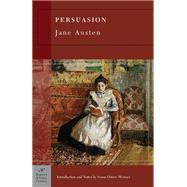From Susan Ostrov Weisser's Introduction to Persuasion
Just as Jane Austen is the favorite author of many discerning readers, Persuasion is the most highly esteemed novel of many Austenites. It has the deep irony, the scathing wit, the droll and finely drawn characters of Austen's other novels, all attributes long beloved of her readers. But it is conventionally said that as her last novel, the novel of her middle age, it additionally has a greater maturity and wisdom than the "light, bright and sparkling" earlier novels, to use Austen's own famous description of Pride and Prejudice, her most popular work. In other words, Persuasion has often been seen as the thinking reader's Pride and Prejudice.
But Persuasion is less "light" in more than one sense; Anne Elliot, its heroine, is introduced as more unhappy and constrained by her situation than any heroine of Austen's since Fanny Price of Mansfield Park. In contrast to Elizabeth Bennet's or Emma Woodhouse's sparkle and volubility, Anne's "spirits were not high," and remain low for much of the novel. But whereas Fanny Price, like Anne ignored and held in low esteem by family members, is perfectly poised to be rescued by love, in fact Anne is barely a Cinderella figure, and not only because she is wellborn, of a better social rank than even the heroine of Emma. In fact, Anne Elliot has more in common with Charlotte Brontë's Victorian heroine Jane Eyre in that she seems at first distinctly ineligible for the role of a beloved, appearing to the world as apparently unlovable and without much physical charm. Anne, however, has none of Jane Eyre's ready temper, tongue, and fire; she tends to think and feel alone and in silence—except, of course, that we, her readers, share the literary mind she inhabits and see the world with her through her finely discerning eyes. Heroines are always subjected to surveillance in nineteenth-century fiction; here the heroine is invisible but voluble in her mind, as Lucy Snowe is in Charlotte Brontë's Villette.
Anne Elliot is a creature of thought and feeling, not what she seems to others. The same may be said of Jane Austen herself, whose life and writing often appear as one thing in the popular mind, yet turn out to be far more complex than convention allows when closely examined. There is the real Jane Austen, who left little in the way of biographical material (no diary has ever been found, and most of her letters were destroyed by their recipients or their heirs); and then there is the Jane Austen of the contemporary imagination. This latter version has colored the many films and television productions of her work, not to mention the societies and cultish fan enthusiasm, which constitute what the critic Margaret Doody calls "Aunt Jane-ism," a phenomenon she defines as "imposed quaintness."
It is easy to see why Austen's novels have become a kind of cinematic fetish: Film adaptations selectively focus on the clear trajectory of the courtship plot, the fine detail, the enclosed, knowable, seemingly nonpolitical world in which everyone seems to know his place. In fact, for many the novels have come to stand for a nostalgia of pre-Industrial Revolution England, an idyll of country houses, gentrified manners, and clear moral standards, an Old World apart from the chaos of urban, technologized life and the struggle for modern capital. So solidified has this mythical vision become that there is now a popular series of mystery novels by Stephanie Barron that feature Jane Austen as the amateur detective, similar to Agatha Christie's spinster figure Miss Marple, solving fictional mysteries with pert and ingenious wit in her quaint village.
